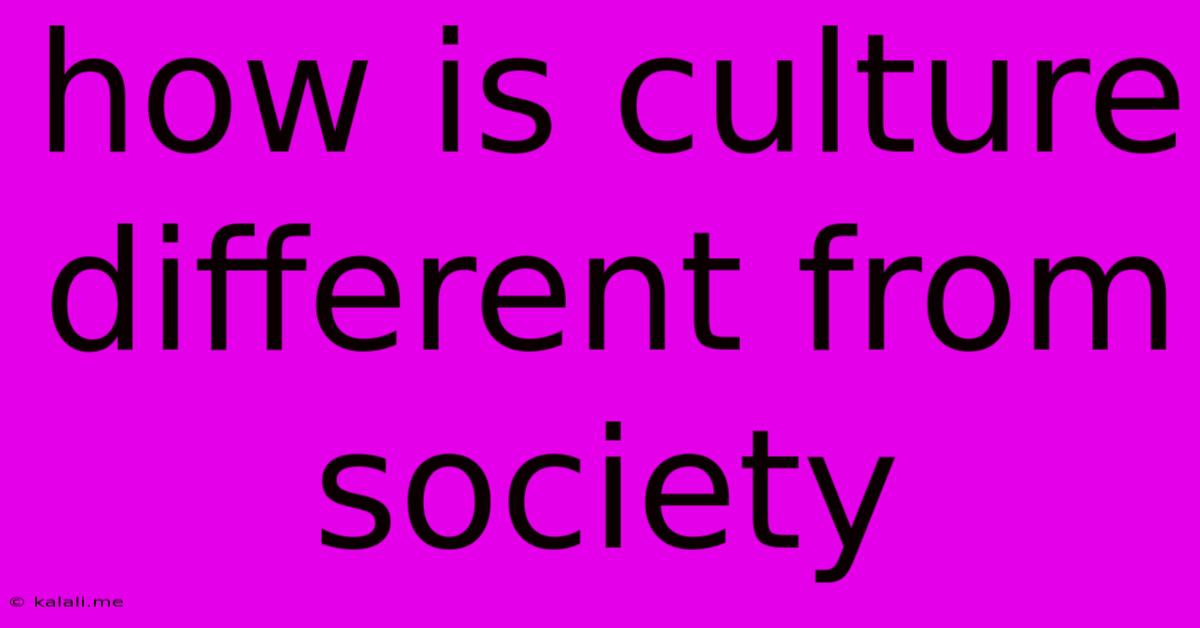How Is Culture Different From Society
Kalali
Jun 13, 2025 · 3 min read

Table of Contents
How is Culture Different from Society? Understanding the Nuances
Culture and society are often used interchangeably, leading to confusion. While deeply intertwined, they are distinct concepts. This article will delve into the differences between culture and society, clarifying their unique characteristics and relationships. Understanding this distinction is crucial for anyone studying sociology, anthropology, or simply navigating the complexities of human interaction.
What is Society?
A society is a group of individuals who live together in a defined geographical area, sharing a common culture and interacting with one another. It's a system of social relationships, involving various institutions like family, government, and education. Think of society as the structural framework within which people live and interact. Key characteristics of a society include:
- Social Structure: Defined roles, hierarchies, and institutions that govern social interactions.
- Geographic Location: Members generally inhabit a shared physical space.
- Shared Interaction: Regular contact and interaction among members.
- Interdependence: Members rely on each other for various needs and resources.
What is Culture?
Culture, on the other hand, refers to the shared beliefs, values, customs, behaviors, and artifacts that characterize a group or society. It's the non-material and material aspects that shape the way individuals within a society think, act, and interact. Culture is learned, transmitted across generations, and constantly evolving. Key elements of culture include:
- Beliefs: Shared ideas and understandings about the world.
- Values: Shared principles and standards that guide behavior.
- Norms: Rules and expectations that govern conduct.
- Symbols: Objects, gestures, or images that carry meaning.
- Language: A system of communication that shapes thought and perception.
- Material Culture: Physical objects and technologies created by a society.
The Relationship Between Culture and Society:
The relationship between culture and society is symbiotic. Society provides the structure and context for cultural development and transmission. Culture, in turn, shapes the behaviors, beliefs, and interactions within society. You can't have one without the other; they are mutually constitutive.
Consider this analogy: society is the house, and culture is the furniture, decorations, and overall atmosphere within that house. The house (society) provides the framework, but the furniture and decorations (culture) give it character and meaning.
Key Differences Summarized:
| Feature | Society | Culture |
|---|---|---|
| Definition | Group of individuals living together | Shared beliefs, values, customs, etc. |
| Focus | Social structure and interaction | Shared meaning and practices |
| Tangibility | Concrete (physical presence) | Both tangible (artifacts) and intangible (beliefs) |
| Primary Concern | Organization and relationships | Shared understanding and way of life |
In Conclusion:
While inseparable, society and culture are distinct concepts. Society refers to the group of individuals living together, while culture encompasses the shared beliefs, values, and practices that shape their lives. Understanding the nuances of this distinction offers a more profound understanding of human societies and the forces that shape them. By appreciating the interplay between these two concepts, we can better navigate the complexities of social interactions and appreciate the diverse tapestry of human experience across various societies and cultures worldwide.
Latest Posts
Latest Posts
-
Which Answer Choice Correctly Defines Plot
Jun 14, 2025
-
A Biological Community Of Interacting Organisms And Their Physical Environment
Jun 14, 2025
-
Least Common Multiple Of 14 And 49
Jun 14, 2025
-
Which Of The Following Is A Natural Polymer
Jun 14, 2025
-
Which Elements On The Periodic Table Are The Least Reactive
Jun 14, 2025
Related Post
Thank you for visiting our website which covers about How Is Culture Different From Society . We hope the information provided has been useful to you. Feel free to contact us if you have any questions or need further assistance. See you next time and don't miss to bookmark.